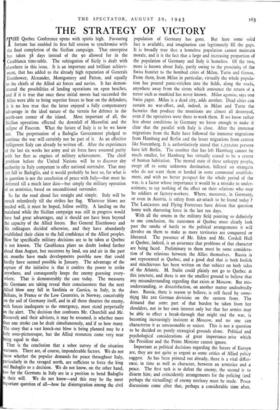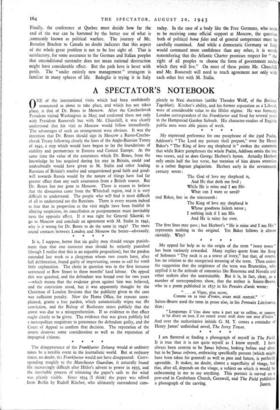THE STRATEGY OF VICTORY
THE Quebec Conference opens with spirits high. Favouring fortune has enabled its first full session to synchronise with the final completion of the Sicilian campaign. That enterprise has taken 38 days instead of the 90 allowed for in the Casablanca time-table. The subjugation of Sicily is dealt with elsewhere in this issue. It is an important and brilliant achieve- ment, that has added to the already high reputation of Generals Eisenhower, Alexander, Montgomery and Patton, and equally to the chiefs of the Allied air forces and navies. It has demon- strated the possibilities of landing operations on open beaches, and if it is true that once these initial moves had succeeded the Allies were able to bring superior forces to bear on the defenders, it is no less true that the latter enjoyed a fully compensatory advantage in the ideal nature of the terrain for defence in the north-east corner of the island. Most important of all, the Sicilian operations effected the downfall of Mussolini and the eclipse of Fascism. What the future of Italy is to be we know not. The perpetuation of a Badoglio Government pledged to continue the war will certainly not be part of it. As an effective belligerent Italy can already be written off.. After the experiences of the last six weeks her army and air force have assumed parity with her fleet as engines of military achievement. The chief problem before the United Nations will be to discover any authority in Italy competent to offer national surrender. That may yet fall to Badoglio, and it would probably be best so, for what is in question is not the conclusion of peace with Italy—that must be deferred till a much later date—but simply the military operation of an armistice, based on unconditional surrender.
So far the road ahead lies straight and simple. Italy will be struck relentlessly till she strikes her flag. Whatever blows are needed will, it must be hoped, follow swiftly. A landing on the mainland while the Sicilian campaign was still in progress would ave had great advantages, and it should not have been beyond the capacity of the Allied forces. But General Eisenhower and his colleagues decided otherwise, and they have abundantly stablished their claim to the full confidence of the Allied peoples. How far specifically military decisions are to be taken at Quebec is not known. The Casablanca plans no doubt looked farther ahead than August, but successes by land, sea and air in the past six_ months have made developments possible now that could rdly have seemed possible in January. The advantage of the apture of the initiative is that it confers the power to strike anywhere, and consequently keeps the enemy guessing every- where. That is demonstrably the case today. The measures Germans are taking reveal their consciousness that the next -ed blow may fall in Sardinia or Corsica, in Italy, in the alkans, in France or the Low Countries, in Norway, conceivably on the soil of Germany itself, and in all those theatres the enemy, 'Eh forces inadequate to the emergency, must stand perpetually n the alert. The decision that confronts Mr. Churchill and Mr. oosevelt and their advisers, it may be assumed, is whether more an one stroke can be dealt simultaneously, and if so how many. he story that a vast knock-out blow is being planned may be a ttle over-picturesque, but the Allied resources come very near ing equal to that.
That is the conclusion that a sober survey of the situation warrants. There are, of course, imponderable factors. We do not know whether the popular demands for peace throughout Italy, rticularly in the ravaged north, are sufficient to force the king and Badoglio to a decision. We do not know, on the other hand, ow far the Germans in Italy are in a position to bend Badoglio o their will. We do not know—and this may be the most mportant question of all—how far disintegration among the civil population of Germany has gone. But here some solid fact is available, and imagination can legitimately fill the gaps.
It is broadly true that a homeless population cannot maintain morale, and it is the fact that a large and increasing proportion of the population of Germany and Italy is 'homeless. Of the two, more is known about Italy, partly owing to the proximity of the Swiss frontier to the bombed cities of Milan, Turin and Genoa. From them, from Milan in particular, virtually the whole popula- tion has poured panic-stricken into the fields, along the roads, anywhere away from the sirens which announce the return of a terror such as mankind has never known. Milan agonise, says one Swiss paper. Milan is a dead city, adds another. Dead cities can sustain no war-effort, and, indeed, in Milan and Turin the factories that produce the munitions are almost all destroyed, even if the operatives were there to work them. If we know rather less about conditions in Germany we know enough to make it clear that the parallel with Italy is close. After the immense migrations from the Ruhr have followed the immense migrations from Hamburg and Berlin and the lesser migrations from centres like Nuremberg. It is authoritatively stated that 1,25o,000 persons have left Berlin. The number that has left Hamburg cannot be much smaller, for Hamburg has virtually ceased to be a centre of human habitation. The mental state of these unhappy people, swept of to some unknown destination, billeted on strangers who do not want them or herded in some communal establish- ment, and with no better prospect for the whole period of the war, is a factor whose importance it would be a mistake to under- estimate, to say nothing of the effect on their relations who may be soldiers or factory-workers. Where, moreover, in Germany, or even in Austria, is safety from air-attack to be found today ? The Lancasters and Flying Fortresses have driven that question home with shattering force in the last ten days.
With all the omens in the military field pointing so definitely to one conclusion, the statesmen at Quebec must clearly look past the smoke of battle to the political arrangements it will devolve on them to make as more territories are conquered or liberated. The presence of Mr. Eden and Mr. Cordell Hull at Quebec, indeed, is an assurance that problems of that character are being faced. Preliminary to them must be some considera- tion of the relations between the Allies themselves. Russia is not represented at Quebec, and a good deal that is both foolish and mischievous has been written on that subject on both sides of the Atlantic. M. Stalin could plainly not go to Quebec at this juncture, and there is not the smallest ground to believe that any misunderstanding regarding that exists at Moscow. But mis- understanding, or dissatisfaction, on another matter undoubtedly does. Russia, there is reason to believe, is still faced by some- thing like 200 German divisions on the eastern front. The demand that some part of that burden be taken from her shoulders, not in her own interest only but that her armies may be able to effect a break-through that might end the war, is becoming increasingly insistent at Moscow, and no one can characterise it as unreasonable or unjust. This is not a question to be decided on purely strategical grounds alone. Political and psychological considerations of great importance arise which the President and the Prime Minister cannot ignore.
Important as political decisions regarding the future of Europe are, they are not quite as urgent as some critics of Allied policy suggest. As has been pointed out already, there is a vital differ- ence, in time as well as character, between an armistice and a peace. The first task is to defeat the enemy, the second is to disarm him; and coincidently arrangements for the policing (and perhaps the victualling) of enemy territory must be made. Peace discussions come after that, perhaps a considerable time after. Finally, the conference at Quebec must decide how far the end of the war can be hastened by the better use of what is commonly known as political warfare. The journey of Mr. Brendan Bracken to Canada no doubt indicates that this aspect of the whole great problem is not to be lost sight of. That is satisfactory, for some assurance to the German and Italian peoples that unconditional surrender does not mean national destruction might have considerable effect. But the path here is beset with perils. The "under entirely new management " stratagem is familiar in many spheres of life. Badoglio is trying it in Italy today. In the case of a body like the Free Germans, who seem to be receiving some official support at Moscow, the question both of political bona fides and of general competence must be carefully examined. And while a democratic Germany or Italy would command more confidence than any other, it is worth remembering that the Atlantic Charter promises respect for " the right of all peoples to choose the form of government under which they will live." On most of these points Mr. Churchill and Mr. Roosevelt will need to reach agreement not only with each •other but with M. Stalin.



























 Previous page
Previous page